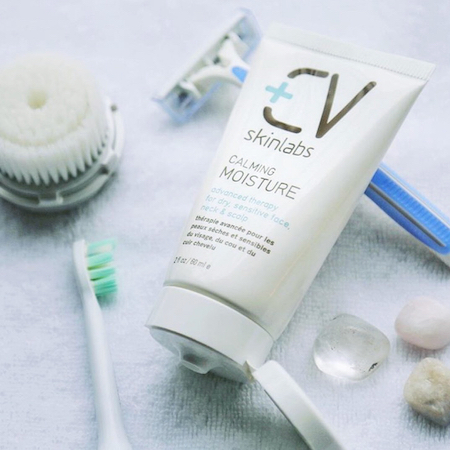
When you’re thinking about how to protect your skin from the winter, it’s important to remember the brain-skin connection.
Because it’s not only the cold weather, dry air, and harsh wind that can damage your skin.
It’s the lack of sunlight too, particularly if that leads to you experiencing the winter blues.
What Are the Winter Blues?
When the days get shorter and the clouds seem to hang around forever, many people find that their energy wanes and their mood drops. They crave more high-fat, high-sugar comfort foods and find it easier to gain weight.
What is it about this time of year that can leave us feeling this way? The National Institutes of Health (NIH) has been studying both the winter blues and a more serious type of depression called seasonal affective disorder (SAD) for more than 30 years. They’ve learned a lot, but they still don’t have all the answers.
What we do know is that the reduced sunlight in the fall and winter months can disrupt the body’s internal clock—what’s called the circadian rhythm. Our eyes take in the sunlight and send cues to the brain to keep us awake and alert. At night, the brain produces melatonin, which compels us to sleep.
Shortened daylight hours can mess up this natural rhythm, leaving us feeling more sleepy, draggy, and tired, as well as gloomy and irritable.
Most people have heard of this effect, but they usually don’t think about how it may affect their skin.
How to Protect Your Skin from the Winter Blues: Is This Affecting You?
Not sure if you may be struggling with the winter blues? Ask yourself if you’re suffering any of these symptoms:
- Having low energy even after a good night’s sleep
- Having trouble sleeping
- Lacking the motivation to complete some tasks
- Changes in appetite or weight
- Feeling sluggish or agitated
- Having difficulty concentrating
- Losing interest in activities you used to enjoy
How to Protect Your Skin from the Winter Blues: How It Works
That your mental health can affect the health of your skin is now such an accepted idea that there is now a new field of study called “psychodermatology.” It combines the fields of psychology with dermatology to help create more holistic solutions for patients.
For years, scientists weren’t sure about this. But new studies changed that.
In a 2020 review, for example, researchers examined the brain-skin connection, and noted the following:
- Serotonin, the “good mood” neurotransmitter in the brain that plays a key role in depression, also plays a fundamental role in skin homeostasis.
- Psychological stress can have effects on the skin, including the development or exacerbation of diseases like psoriasis, atopic dermatitis, and eczema.
In an earlier review, researchers found that the skin actively participates in the stress response: “There are also feedback mechanisms and crosstalk between the brain and skin,” the scientists wrote, adding that chronic stress can have a detrimental effect on skin aging.
Richard G. Fried, MD, wrote in Practical Dermatology that psychological distress “can result in elevated levels of neuropeptides and other pro-inflammatory cytokines that can exacerbate existing skin disease.”
In other words, if you notice more redness, irritation, and acne when you’re also suffering the winter blues, that’s because your mental health may be inspiring inflammation in the skin.
Dr. Amy Wechsler, MD, a dermatologist in New York City, agrees, stating that chemicals associated with depression can prevent the body from repairing inflammation in cells. These chemicals can also affect sleep, and as we know, a lack of sleep translates into an older-looking complexion.
How to Protect Your Skin from the Winter Blues: What to Do?
If you think you may be suffering from the winter blues or the more serious SAD, start by addressing that condition immediately. Consider these steps:
Try Light Therapy
The idea is to expose yourself to bright light more often. Try to get outside when the sun is out. On those gray days, use a lightbox that helps mimic the light of the sun. Make sure it’s at least 10,000 LUX, and look into it for 20-30 minutes a day. Studies have shown that light therapy can relieve SAD symptoms for as much as 70 percent of patients who try it.
Consider Talk Therapy
Cognitive behavioral therapy (CBT), a type of talk therapy, can help seriously depressed patients. If you don’t think your symptoms are serious, it can still help to talk to someone about how you may be feeling. The goal is to reframe your negative thoughts into those that are more positive.
Get More Active
The winter season often means a drop in activity, and that can contribute to the winter blues. Find ways to get more active. Go out more often with friends, exercise regularly, and consider volunteering in your community. Evidence shows that 30 minutes of vigorous exercise three times a week is effective against depression.
Eat Well
Winter weather compels us to crave sugary foods, carbohydrates, and high-fat foods, but these can contribute to that low-energy, blue feeling. Return to a healthy diet that includes plenty of fruits and vegetables.
Have a Regular Sleep/Wake Time
Going to bed at the same time every night and getting up at the same time every morning—even on the weekends—can help stabilize your internal clock and allow you to wake up feeling energized instead of fatigued.
How to Protect Your Skin from the Winter Blues: Pamper Your Skin
Addressing your mental health will naturally help your skin, but you can take some additional steps to reduce your risk of inflammation, redness, itch, and irritation.
Bring Your Routine Back to the Basics
Eliminate any products with extra fragrance, colors, or dyes, and give your skin a break for a week or two. Go back to only your cleanser, toner, and moisturizer. Make sure these products are “clean” without harmful or harsh chemicals. (All of our CV Skinlabs products are clean and 100 percent free of harsh and harmful ingredients.)
Focus on Taming Inflammation
Stress and depression increase inflammation in the skin, which can lead to redness, itch, irritation, and acne. If you’re suffering from these symptoms, focus on reducing that inflammation.
We recommend using our Rescue + Relief Spray as your toner, since it has natural cooling and anti-inflammatory ingredients in it, then follow with our Calming Moisture, which also soothes inflammation while helping to repair the skin’s outer barrier.
Consider a Calming Mask
If these steps don’t help, consider adding a calming mask to your routine. If you’re suffering from acne, make it an oil-absorbing clay mask. If your skin is dry, red, and irritated, use a moisturizing, hydrating mask.
You can also apply a robust amount of Calming Moisture to your skin and then let it sit for 15 minutes.
Have you noticed the winter blues affecting your skin?



